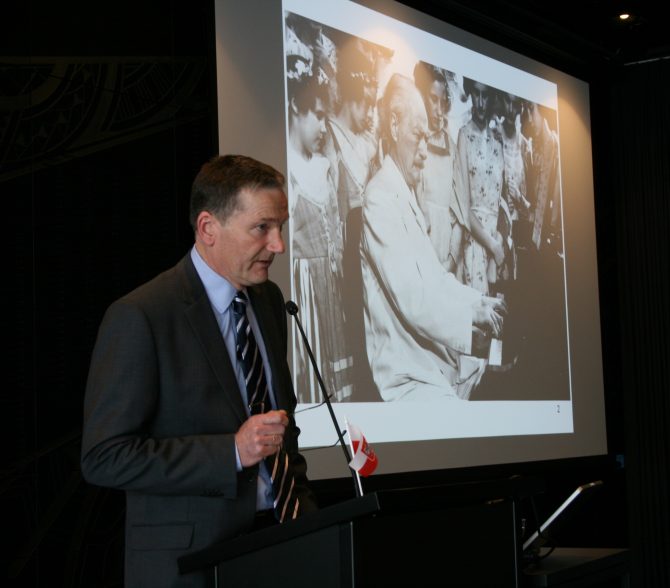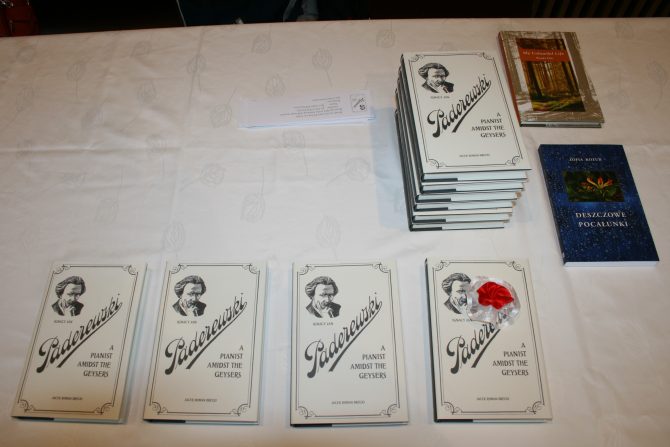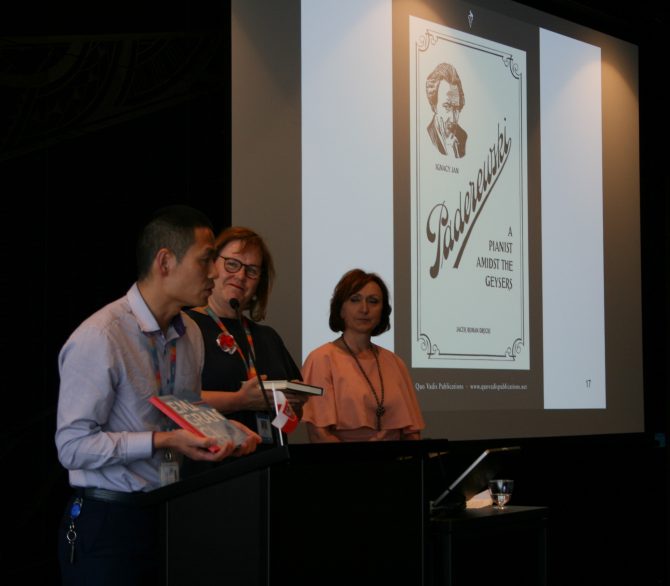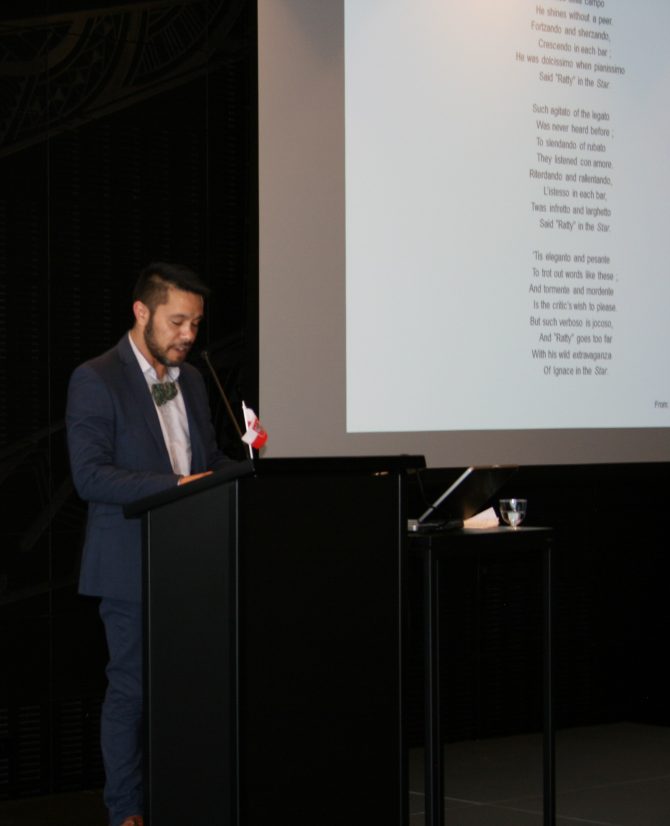One Saturday afternoon at Tūranga, author Jacek Roman Drecki spoke grippingly of Paderewski, perhaps the greatest pianist the world has ever seen, and one of Poland's most revered premiers. Drecki's new work Ignacy Jan Paderewski, A Pianist Amidst the Geysers, takes a fascinating look at Paderewski's concerts and visits to New Zealand, and the effects they had musically, politically, and historically.
By way of introduction, Dorota of Between the Waters; Polish Legacy in New Zealand, very accurately described Drecki's forthcoming talk as being 'one very interesting Pole talking about another very interesting Pole'.
Drecki, a Polish New Zealander residing in Auckland, was drawn to the subject of Paderewski's visits to New Zealand "not because of an interest in music, but because of a fascination for natural landscapes - an interesting combination.". Dorota further explained that It was after reading of Paderewski's own fascination with the landscape of New Zealand, that Drecki was drawn to research further about this fascinating moment in time. Thanks to Between the Waters - Polish Legacy in NZ Charitable Trust, the Polish Embassy in Wellington, and Drecki himself, the audience at Tūranga was lucky enough to hear more of the story behind this fascinating work.
Ignacy Jan Paderewski, A Pianist Amidst the Geysers
Drecki began his talk by describing some of the difficulties he encountered during his research. Auckland Libraries had the only copy of Paderewski's memoir in its original form, which had to be retrieved from a vault upon each of his visits. This service incurred a $10 fee because Drecki was 'on the wrong side of the Harbour Bridge'. Happily, when Drecki came to Christchurch City Libraries to access old 1904 newspapers on Microfilm, there was no charge, 'and no one asked which side of the Harbour Bridge I came from' he joked. Drecki thanked Christchurch City Libraries and kindly donated a copy of his work to the collection.
Another incentive Drecki had for producing his work on Paderewski and New Zealand was that he "met a few 'Paderewskis' in New Zealand". He explained that when he was working at estate houses in New Zealand, he once spoke to a family who had a pianola in their drawing room. When Drecki asked if they had any Paderewski recordings, the woman replied: "funny you ask, we probably do not- because I was Paderewski!" - Paderewski was the name that her family addressed her by!
Drecki broke his fascinating talk into two parts, the first addressing the topic of "Polish music's imprint on New Zealand Soul". He conceded that while Polish music was played and enjoyed in New Zealand, it had no more influence than other international music at that time. However the influence of Polish musicians was very great indeed. They introduced an appetite for musical masterpieces that epitomised Polish music, pieces from composers such as Chopin:
"Paderewski filled his entire programme with Chopin on occasions - his interpretation of very Polish music, in a very Polish way, with his very Polish heart, was very applauded and very appreciated by New Zealand audiences."
Paderewski is not the only Polish musician to have had an effect on New Zealand - there have been others such as Rubenstein, and even today there are 4 Polish members of the Auckland Philharmonic Orchestra.
Paderewski helped young New Zealand musicians too - sponsoring a pianist from Timaru, and recommending a 12 year old named Frank Hutchins to a musical education in London. Drecki played a clip of Paderewski's Minuet in G from Moonlight Sonata, to illustrate the Polish heart to his music.
The second part to Drecki's talk looked at the subject of the New Zealand soul. While he had been asked to discuss the soul in particular, Drecki preferred to focus on the New Zealand spirit. As he explained, Christchurch could be seen to be the most jinxed city in New Zealand, with disasters of man made and natural causes running rife particularly in the last decade, but Christchurch showed itself to be the most resilient city in New Zealand instead, always managing to bounce back. People came together, as could be seen, for instance, in the student volunteer army gathering together to clear liquefaction after the earthquake. In his view, misfortunes such as these give people a shared history, build a nation's identity, and therefore impact on a nation's spirit. Conversely therefore, good experiences can do the same. He related the story a Polish friend working on a New Zealand vineyard who once told him of an employer who treated him disdainfully until he found out he was Polish. He declared that Polish people"'are of fine stock. I know because I once saw Paderewski play and he was the most magnificent man I have ever seen". Drecki observed that like hundreds of others, the man would have shared a wonderful experience, Paderewski would have left a positive impact on the spirits of all those who had attended his concert for years to come.
So what exactly did Paderewski do that created such an impact on people's spirit? Drecki observed that firstly, Paderewski always gave his very best to his audience. He rehearsed for his audiences in New Zealand, just as much as he did for his audiences in Vienna or Paris. There was reason he was so adored - why the Canterbury Hall (a 2000 capacity venue) was magically made to fit in 500 more audience members, why 'Paddymania' was rife throughout the world.
Secondly, he befriended New Zealanders, taking a genuine interest in Māori and Pākehā alike. He was impressed not only by the musical sophistication of his audiences, and by the work that had been achieved in a short space of time in building cities. He spread the word too, giving New Zealanders a sense of pride in their culture and achievements.
Lastly he exercised his usual diplomacy, for example, donating the proceeds of his Wellington concert to the maimed New Zealand soldiers of the Great War. His was a thank you tour to the nation of New Zealand, for while Poland had regained her independence after the war, Paderewski was aware of the very great sacrifices New Zealand had made.
Why would Paderewski go to all this effort to make New Zealanders feel appreciated and respected, to so positively impact the nation's spirit? Drecki concluded, because he really, genuinely liked New Zealand.
Special thanks to Tom and Dorota of Between the Waters - Polish Legacy in NZ Charitable Trust, for the wonderful photos, and for all their help and support in writing about this event.








Add a comment to: ‘Paddymania’ and Poles in New Zealand